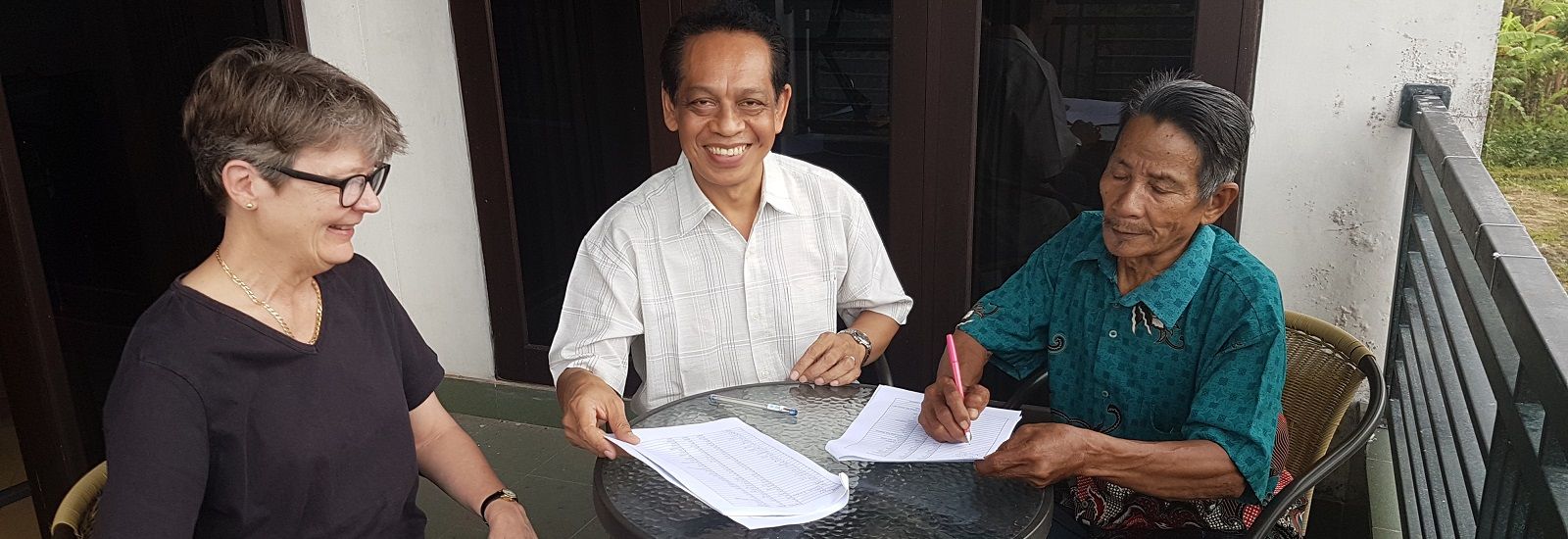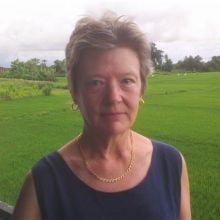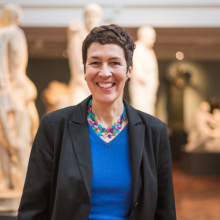
Back from the brink
With half of the world's languages facing extinction by the end of this century, Mary Dalrymple, Professor of Syntax, reflects on how she has helped to save one of the rarest languages on the planet. In 2011, only three people, aged in their 60s and 70s, spoke the language of Dusner – which originates and is spoken in a village of the same name in West Papua, Indonesia. Despite the entire province being hit by floods and volcanoes, Mary and her team documented the language and saved it from being lost forever.
Katrin Kohl, Professor of German Literature, spoke to Mary to find out more, and explore the links between her research and policy in Indonesia – the world's fourth most populous country, spread across 17,000 islands, and home to around 700 languages.
Katrin Kohl - What motivates you? Why is it important that we should stop languages from disappearing?
Mary Dalrymple - It’s about helping people preserve an important aspect of their identity – something that native speakers of English, and other widespread languages, can sometimes take for granted.
Preserving endangered languages can also enhance our own and others' botanical, zoological and other scientific knowledge. For example, if the name of a plant translates to ‘the plant that cures malaria’, it might be a clue to look into that more carefully.
We can produce materials about endangered languages, which will be available for future generations of linguists, speakers, and even descendants, who might want to know what their grandparents sounded like.
Preserving endangered languages can also enhance our own and others' botanical, zoological and other scientific knowledge. For example, if the name of a plant translates to ‘the plant that cures malaria’, it might be a clue to look into that more carefully.
Finally, this work also informs thinking on history and migrations across the world, where we still have a lot of unanswered questions.
How does policy impact your work? To which policy or policies does your research relate?
Around 20-25 years ago, the Indonesian Ministry of Education implemented changes to the school curriculum.
There are over 700 languages spoken in Indonesia, and the country is very culturally diverse. In a sense, the unifying factor across all of that is the language of Indonesian.
But the Ministry of Education there takes the view, I think quite rightly, that just trying to make everyone 'Indonesian' runs the risk of losing all of the very much more diverse and local cultures.
So, it introduced a 'local content' policy. It means that when children do not speak Indonesian as their first language, elementary schools are obliged to use those first languages for at least some tuition.
For somewhere like Papua, where there are nearly 300 languages spoken, this can be tricky.
Moreover, someone has to decide what ‘local’ means. I mean, how small do you get when you’re saying 'local'? There is a tension. If you get too small and too local, there’s no one to develop the curriculum, and you can’t implement the policy. If you zoom out too far, then you’re calling something local content curriculum which isn’t really local. So that’s difficult to manage, really.
How do you balance the concerns and priorities of the local population with the need to formalise the language, and make policies workable?
Sometimes it can be tricky. For example, if you take something as fundamental as the orthography – a set of conventions for writing a language – you often have the situation where, say, someone will have tried to write the Bible or something in that language. People may or may not have made good decisions about the orthography. It might or might not be a good representation of how the language is pronounced.
You have to either stick with that orthography, because it’s theirs; they invented it and they like it. Or, if it hasn’t really gelled yet and you think there are better choices, then you have to enter into a negotiation, because you can’t just impose an orthography on them. It has to be by mutual agreement.
If you produce an orthography that you think is great, but the community doesn't agree, then they’re not going to be happy with the project, because they’re going to have a whole lot of stuff in their language in a form that they don’t like. So, it’s important to get that right.
Tell us more about your current work in Indonesia…
I've worked on three Indonesian languages of radically different sizes. The one I’m working with now – Enggano – is maybe the trickiest in terms of the policy. It’s spoken by only around 1,000 people, on an island of the same name. The local governmental headquarters – the Bengkulu Regency Government – is on the mainland, 12 hours away on a ferry.
The history of the language is completely unclear; there hasn't been enough research on it yet. But one aspect is that Indonesia has a programme called Transmigration, where people get moved out of the large urban areas and into other areas. A huge number of people, usually from Java - where more than half Indonesians live – just come and start living in an area. So, the proportion of Enggano speakers on Enggano is low. It’s not like every islander speaks the language.
Our team includes two men who grew up in Enggano; one of whom is now studying at university in Bengkulu. We are having conversations with people who speak Enggano and then creating documentation resources - recordings, transcriptions, and analysis of their stories. We’re also going to produce a grammar of Enggano. We want to make these resources available at the end of the project to help preserve the language.
Building on this, we are also creating educational materials. There is a requirement that these resources follow the government guidelines for local content that’s delivered in schools. For authorities, 'local content' means the general area, but the people on the island want to include some Enggano language and culture in the local content curriculum. They just don’t have the resources at the moment.
We're taking advantage of local content policy, because it gives an official sanction to the idea that we should develop curricular materials. But we have to produce materials that fit with the government's guidelines. There’s a kind of give and take with the government.
It's not our business to tell people that they should or shouldn’t speak the language. But we can work with those interested to develop resources that help them keep that choice a viable one.
The local content policy doesn’t guarantee the survival of Enggano – but those who speak it don’t have the resources to help ensure that it can. The grammar we’re working on will be one such resource, and can help make the difference.
Our hope is that, as the project progresses, we can convince the local government that for Enggano Island, local content means of Enggano, not just the kind of general larger region.
It's not our business to tell people that they should or shouldn’t speak the language. But we can work with those interested to develop resources that help them keep that choice a viable one.
What other work have you done in Indonesia?
Prior to Enggano, between October 2010 and December 2011, I worked on the project at Dusner.
We produced a suite of multimedia materials preserving the language, including digital video recordings of stories and conversations in the village; transcriptions and translations, linguistically annotated texts in that can be read by people and machines; a glossary of basic words and affixes, and a grammar outlining the core structural properties of the language.
We saved that language – it would have gone forever, had we not been involved. The only speaker who remained in the village was in her late seventies, and she wasn’t particularly enthusiastic about doing curriculum development at her age.
It was quite extreme because there is no electricity in the village. We had all these recorders and equipment, and had to figure out how to use it. We ended up crossing a bay in the village to a larger city where they had electricity.
We saved that language – it would have gone forever, had we not been involved. The only speaker who remained in the village was in her late seventies, and she wasn’t particularly enthusiastic about doing curriculum development at her age.
Prior to that, the first Indonesian language I worked on is called Biak, which is spoken in Western Indonesia, and it has about 30,000 speakers or so.
When we wrote the grant to study the language, we didn’t include any plans for feeding into the local curriculum, but it turned out that what we produced potentially did feed into that.
How did you get into language documentation? It looks enormously complex.
If we were doing language documentation in the early 20th century, the tools would have been a notebook and pen, and that's it. You had enormously talented people, who did lots of work, but there’s absolutely no way of knowing that they wrote with accuracy. There were no recordings, so we will never know what people were saying or trying to convey.
Now, we have all kinds of technology. We have sophisticated recording equipment and computer programmes. We can even document on phones now. It’s actually quite a challenge to keep up with all the advances, because new tools are becoming available all the time.
You have to be led by the community you're working with. These are their languages, not ours. Our job is to help them keep them alive if that’s what they want.
But it's so important because recordings of people telling stories are more engaging than books on shelves. People are always very enthusiastic about wanting to be the ones to tell the story, show how they do things and so on, so it’s easy to get the community involved.
When did your interest in languages start?
In childhood, really – but it took me a long time to pick it up properly. After university, I taught English. I lived and worked abroad – in Japan for 3.5 years, and in Nepal for 1.5 years. I wanted to become a better teacher of English and it went from there.
In 1990 I took a shot in the dark and studied for a PhD in linguistics at Stanford University. After working for 13 years at Xerox Parc, I took up a position in the computer science department at King's College, London. I moved to what is now Oxford's Faculty of Linguistics, Philology and Phonetics in 2004.
So, looking back on your career, what advice might you give to your younger self or to researchers with less experience of policy engagement?
People should not just jump into this type of work without knowing and understanding the relevant national, regional or local policy. It's very difficult to do that if you don't read Indonesian, and are not familiar with how things work in the Indonesian educational system or specific rules on local content. I would not have attempted it without having access to the expertise of my colleagues, who have already done work in this area. Good intentions aren’t enough – you have to really know what you’re doing.
You also have to be led by the community you're working with. These are their languages, not ours. Our job is to help them keep them alive if that’s what they want.
You need to take everyone into account in making these decisions and be sensitive to the local situation.

